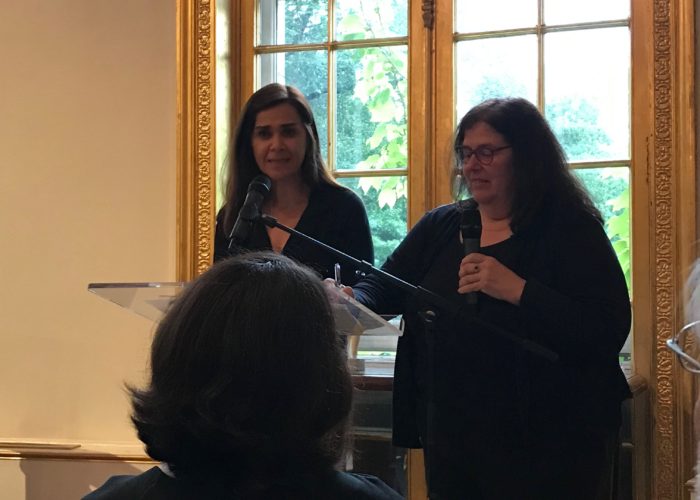Last night, in the gilded reception room of the French Embassy, Négar Djavadi and her translator Tina Kover accepted the Albertine Prize for Disoriental, published by Europa Editions. From a shortlist of five novels published within the last year, readers had voted to give the award to Djavadi’s first novel, the tale of a young woman recalling her own past and her family’s history, from her grandmother’s birth in a late 19th-century harem in northern Iran through her childhood in Tehran to her present incarnation as a 25-year-old French-Iranian punk fan.

The Albertine Prize ceremony is always a unique opportunity to hear an author speak about her work and to get a sense of the collaboration and appreciation between author and translator. Each time, I’ve picked up on something the author says that crystallizes her approach to her craft. In this case, when Djavadi was asked by François Busnel why her narrative moves back in forth in time, she replied, “Ce n’est pas un récit linéaire, car ce n’est pas linéaire, l’exil” (“It’s not a linear narrative because exile isn’t linear”). She also made it clear that, while the novel contains similarities to her own life, it is not autobiographical, though the theme of exile is clearly something that she feels on a very personal level.

In 2018, the winners were Anne Garréta and translator Emma Ramadan for Not One Day (Deep Vellum), an intimate, erotic, and sometimes bitter collection of memories, written under strict constraints, with each chapter written each day describing a past lover or love. At the award ceremony, Garréta described herself as a “literary DJ,” with a variety of influences, both literary and musical.

The inaugural prize in 2017 was won by Antoine Volodine and translator J.T. Mahany for Bardo or Not Bardo (Open Letter Books), a philosophically comic romp through the Tibetan afterlife, also known as the Bardo, where souls wander for forty-nine days before being reborn with the help of the Book of the Dead. Antoine Volodine is the primary pseudonym of a French writer who also publishes under the names Lutz Bassmann and Manuela Draeger. Volodine, who also translates literary works from Russian into French, described his writing style in this way: “J’écris en français langue étrangère” (“I write in French as a foreign language”). This self-conscious embrace of the “strangeness” of language is matched by unpredictable narrative events in Bardo or Not Bardo and was skillfully maintained in Mahany’s translation.
The Albertine Prize shines a spotlight on French fiction in translation, just in time for summer reading. The other finalists this year were:
- Waiting for Tomorrow by Nathacha Appanah, translated by Geoffrey Strachan (Graywolf Press)
- Small Country by Gaël Faye, translated by Sarah Ardizzone (Hogarth)
- The Perfect Nanny: A Novel by Leïla Slimani, translated by Sam Taylor (Penguin)
- The Order of the Day by Eric Vuillard, translated by Mark Polizzotti (Other Press)
Top image: French-Iranian writer Négar Djavadi, seen alongside interpreter Ellen Sowchek, thanks translator Tina Kover at the Albertine Prize ceremony. Photo: Kate Deimling

